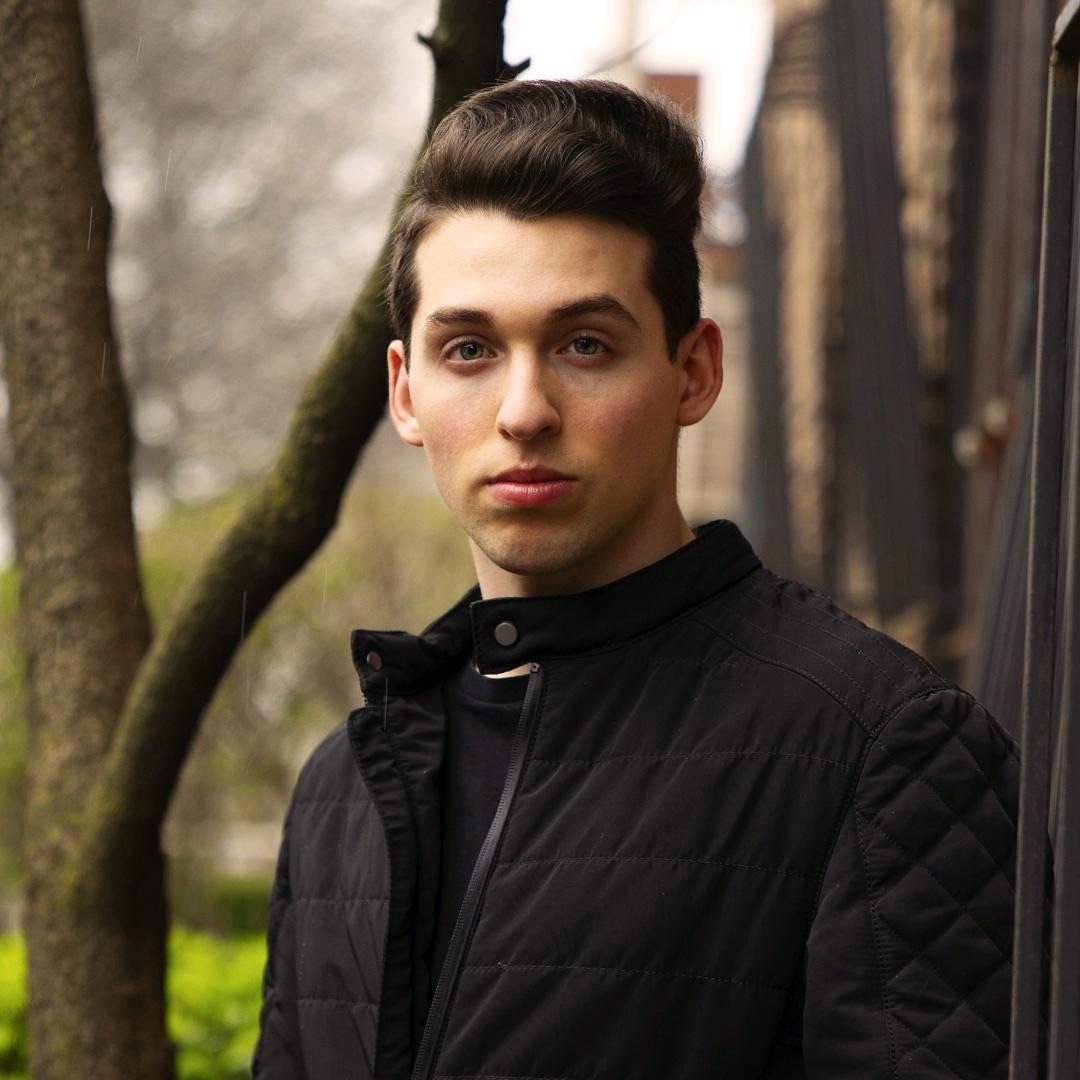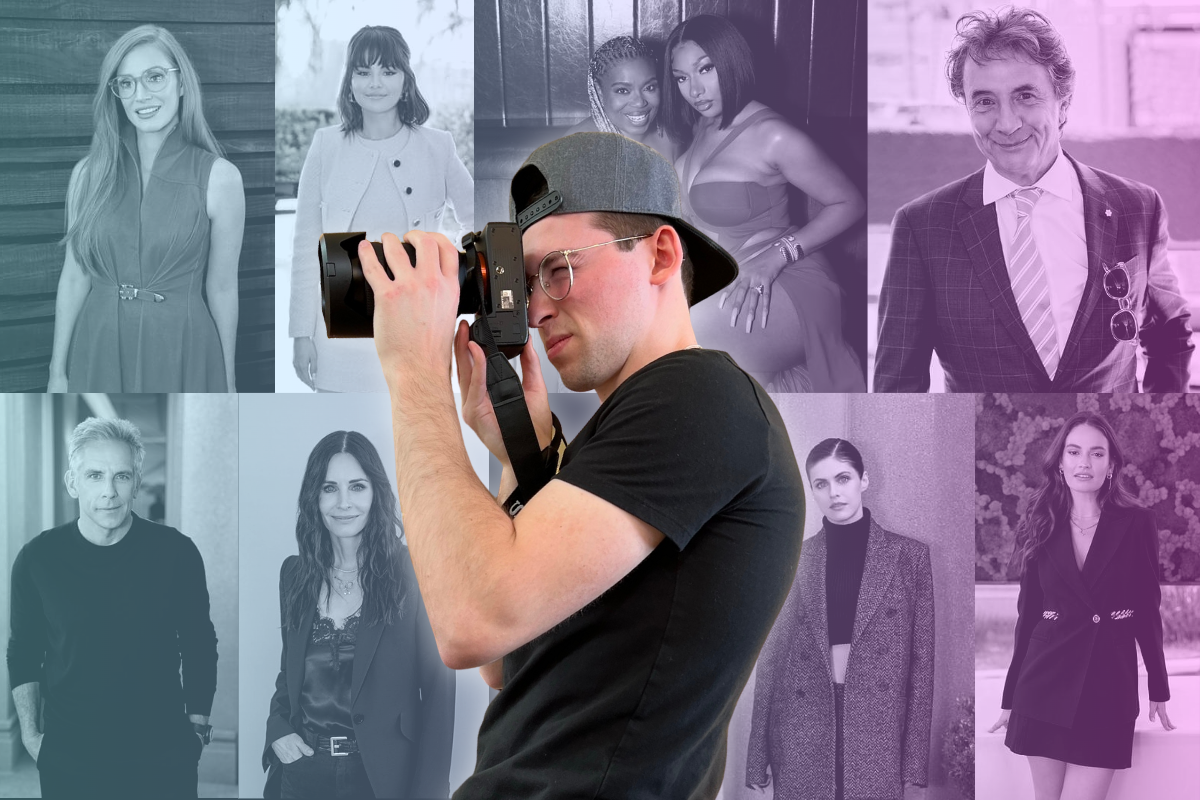Jessica Chastain. Megan Thee Stallion. Selena Gomez. Ben Stiller. What do all of these celebrities have in common, beyond fame and fortune? The answer is deceptively simple: They’ve all had their portraits taken by 23-year-old Jewish photographer Zusha Goldin.
And that’s not all! In the three short years that Zusha has been living in Los Angeles, he’s managed to establish an impressive list of clientele that range from Oscar winners and nominees to TikTok stars and every shade of notoriety in between. (According to these TikToks from Zusha, some of his favorite clients to work have been Janelle Monáe, Sydney Sweeney, Charli D’Amelio and Courteney Cox.)
Ironically, Zusha’s story has its own Hollywood magic about it — the up and coming celebrity photographer grew up in an ultra-Orthodox Jewish family in Crown Heights, Brooklyn, the child of Ukrainian and South African immigrants.

Zusha recently caught up with Hey Alma to talk about his journey from Chabad to Hollywood, dealing with antisemitic stereotypes and Jewish celebrities he’s dying to work with.
This conversation has been lightly edited and condensed for clarity.
Could you tell me about your Jewish identity and background?
I was born and raised in Crown Heights, Brooklyn, the youngest of 11, to a big, ultra-Orthodox, Chabad family. Growing up, I had zero connections, zero money, zero anything. I started doing photography professionally when I was 17 and a half, 18 years old. But it really all began for me earlier. I have photos of me when I was literally 6 years old, with a point and shoot camera that was my older sibling’s, that I borrowed from them.
That’s really cute.
I would go around taking photos at some of my siblings’ weddings. I think I kind of knew I always wanted to be a photographer, but I didn’t think it was a real possibility. Finding success in a creative field is really hard.
I was 17 and a half and in yeshiva and I was like, OK, this is nice. But I think I’m done with it. I’m ready to pursue something that I really love. Everyone around me was like, you’re kind of crazy. I didn’t want to go to college. I still finished yeshiva, and my parents were freaking out. They were like, “You’re throwing your life away. What are you doing? You’re crazy!” And I understand where they were coming from, but I was determined. I knew what I wanted and I wanted to get it.
Not to say that I was self-made, I don’t think anybody is completely self-made. I come from, by American standards, poverty. But I did have older siblings who were working. And so when I wanted to venture into photography professionally, my sister gifted me my first professional camera. So that’s a blessing, right? That’s a privilege to some extent, and I think everyone has blessings and privileges and challenges.
From there, I started taking portraits of my five sisters and five brothers. Then I asked their friends if I could take photos of them, and then I started shooting local engagement parties and events in the Crown Heights community. I did that for a while until it started getting repetitive. Then I started going to Manhattan and approaching random strangers — kind of like the TikTok trend.
You were doing it before it was cool.
Right, I was doing it before it was popular. I would approach random strangers and ask to take their photos. And there was a lot of rejection with that. But I needed to build a portfolio, and I did, just from portraits that I took of random strangers in Washington Square Park.
That takes a lot of chutzpah! How did you get into celebrity portrait photography and break into Hollywood?
I was at a Passover seder in lower Manhattan and one of the people there was a student at New York Film Academy. We started chatting and he was like, “Oh, you’re a photographer? I have a ticket to the Tribeca Film Festival. I’m not going, do you want it?” I didn’t even know what that was at the time. But I was like, sure, let’s go!
So I showed up with some business cards I had printed and in a t-shirt and jeans and a yarmulke. I walked in, and I had never seen anything like that before. It was very Hollywood, with red carpets and plenty of photographers and everyone was in tuxedos and dresses. I felt out of place — at that time I was still very much within the Crown Heights community. But I just started introducing myself to people. I wanted to talk with directors, producers, everyone. I hardly even knew who people were, but I went up to people like Emma Roberts and Evan Peters, back when they were dating, and Paul Reiser. I was just like, “Hi, my name is Zusha Goldin. I’m a portrait photographer. I’d love to work with you. Here’s my business card.” I didn’t realize that you don’t really do that.

That also takes a lot of chutzpah!
But honestly, it got me where I’m at today. I feel like my story can be summed up with having the brazenness to believe that I belong in any room that I walk into. I don’t know where I got that mindset from, but I do fully believe in manifestation. You have to tangibly believe that something is a possibility for you for it to transpire.
So I went up to people and some of them declined. But I met one actor there named Camrus Johnson. He’s a very talented, super, super nice guy. He was just in “Batwoman” and now he’s writing comics for DC. He was actually receptive to my pitch and he was like, “You know what? Let’s shoot.” And that was my first intro into the industry. And from there, I was like, wait, this is so much more fun, so much more creative, so much more exciting. I want to do this. So I decided then to move to LA, because as much as you obviously have to be talented and skilled, which I am, it’s not meritocracy. Getting into the industry is also based on your personal branding and networking, and who knows you and who’s going to give you opportunities early on.
Working in Hollywood, have you had to deal with the stereotype that Jews run Hollywood? And if so, how have you navigated that?
The funniest thing is that for some odd reason I always attract the antisemites. The amount of times people have told me, “You have it so easy in Hollywood because you’re Jewish, and it’s nepotism.” The whole concept of nepotism regarding Jews in Hollywood doesn’t exist, but people really think it does, at least in my experience. There’s so much misinformation and ignorance. Maybe that’s not people’s fault per say, but I feel like it is because you have to educate yourself.
Right, it’s not the job of Jewish people to educate people to change their microaggressions. I think a lot of it has to do with being visibly Jewish, which, by the way, I love your giant Star of David necklace.
Thank you, I wear it everywhere. When I was shooting with Ben Stiller, I was like [nonchalantly pulls the necklace out of his shirt], you know? Every time I work with Jewish celebrities, I always point it out. I’m like, you’re Jewish? I’m Jewish! I love talking about Judaism with my Jewish clients, like I talked about it with Lil Dicky which was cool. I just love mentioning this common bond.

Do you feel more connected to clients when you have a shared Jewish heritage?
I think so. It creates this sense of family, you know?
Right, like mishpacha.
Exactly! Like, “How was your Hanukkah? How was your this? How was your that?”
Do you still identify as Chabad or ultra-Orthodox?
Even though I might not be very religious, I still identify as Chabad. That’s such a hard question though, because even if I identify as Chabad, others might say that I’m not. But I think what’s happening nowadays, which is good, is that [Jewishness] isn’t black and white. There’s a lot more room for individuality and liberalism and acceptance.
I definitely have some religious trauma, but I still wouldn’t change my upbringing. Like, there’s so much good [in Chabad] and I am happy that I was born and raised the way I was. And even so much as 10-15 years ago, there wouldn’t be a space for you if you weren’t a part of the community or you weren’t as religious. But now, in my experience, there is. So I’m very thankful, especially for my family.
I saw you posted on TikTok a list of celebrities you want to photograph in 2023 — it includes Timothée Chalamet, Taylor Swift, Rihanna, etc. It’s still early in the year, but have you checked anyone off the list yet?
It’s funny, I actually made a vision board for 2022. And I basically got everyone except anyone on the vision board. So right now, no, I haven’t gotten anyone on the list yet. But I still have what, like 10 months?

Totally. Can you talk about your upcoming projects?
I have this project about mental health, which I’ve been meaning to shoot for the past few months. It’s about telling a story about different mental health struggles that I go through, or those around me go through, and I want to show it not just through the lens of the person who’s experiencing it, but also through the lens of the family, or the people around the person. I’m still in the beginning stages of that project. I also plan on reviving my YouTube channel, where I’ll be creating entertaining photography content. But I’m mostly just excited for the experiences that I get to have every single day. I know that sounds like a cheesy answer. But getting to photograph some of the biggest people in the world who I grew up watching is such a blessing, and it’s so insane. I’m so thankful.
And I’m hopefully releasing, in a few weeks or months, photos of some big directors I’ve worked with.
Any Jewish directors?
Let me think if they’re Jewish… I don’t think they are. Although, I would love to photograph Steven Spielberg. That would be incredible.
Well I saw you photographed Gabriel LaBelle and Judd Hirsch from “The Fabelmans.” So you have that connection!
That was cool. And now Gabe and I keep on running into each other. We’re basically friends at this point. It’s hilarious. So yeah, I’m sure I will. It’s a matter of time. There’s so much amazing Jewish talent out there that I want to photograph. I would love to work with Doja Cat, Zoë Kravitz, Scarlett Johansson, Evan Rachel Wood, etc. There are so many people I want to photograph, but we’ll get there.



